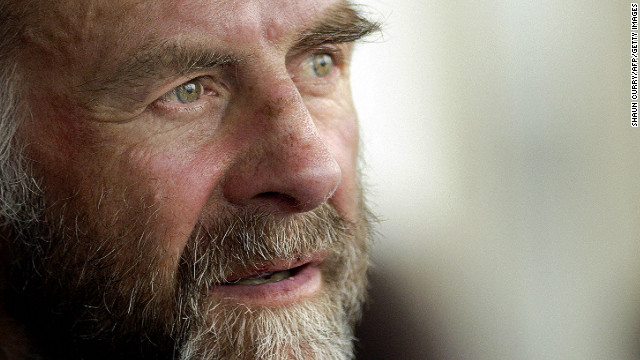Veteran explorer sets off on 'The Coldest Journey'
December 7, 2012 -- Updated 1632 GMT (0032 HKT)

Ranulph Fiennes on Antarctic adventure
STORY HIGHLIGHTS
- British explorer Ranulph Fiennes attempting to overcome temperatures of -90C in winter trek across Antarctica
- The 68-year-old and a five-man team will be first to attempt the 4,000 kilometer journey
- Fiennes hopes to raise $20 million for charity "Seeing is Believing"
- Explorer will miss his wife, children and hot baths during trek which starts in March 2013
It sounds like an
impossible mission, but one that Ranulph Fiennes, legitimately known as
the world's greatest living explorer, could not resist attempting.
Dubbed "The Coldest Journey,"
the five-man expedition, led by the 68-year-old Fiennes, will be the
first to attempt to complete the almost 4,000-kilometer (2,485-mile)
journey across Antarctica in winter.
In doing so, they hope to
find out more about how climate change is affecting the polar ice cap
and raise $10 million for the blindness charity Seeing Is Believing -- adding to the more than $20 million Fiennes has already raised for charities from past expeditions.
The British-born explorer
has previously been the first person to reach both the North and South
Poles by land and the first to cross Antarctica on foot. He has also
reached the summit of Mount Everest and Switzerland's notorious Eiger.
His latest challenge, however, is likely to be his hardest yet.
"This is the first time that if we run into problems like that,
there is no help, because in Antarctica in winter all the rescue
facilities shut off
Ranulph Fiennes
Ranulph Fiennes
As well as the bitter
cold, they will have to cope with life on the Antarctic Plateau, with
the reduced levels of oxygen that comes from being located at 3,800
meters (12,470 feet) equivalent altitude. What's more, they will have to
do all this without the safety net of emergency rescue support, as
aircraft cannot reach inland during the winter months.
"All the expeditions
we've done in 40 years if something had gone wrong in a nasty place, you
can press a beacon. A ski plane can come in," Fiennes told CNN. "This
is the first time that if we run into problems like that, there is no
help, because in Antarctica in winter all the rescue facilities shut
off."
Despite his advancing
years and a number of health scares -- he suffered heart problems while
making an earlier attempt to climb Everest and amputated five of his
fingers using an electric drill from his garden shed after losing them
to frostbite - Fiennes is sanguine about his chances of success.
"I don't think about not
coming back, because I mean, more people get killed on the roads here
[London] than they do in Antarctica. I mean, I had a massive heart
attack reading a magazine on an airplane. You don't need to go to
Antarctica to pop it."
Compared to the early
polar explorers of the 1900s, Fiennes's team will benefit from some
innovative equipment, including boots with electrically-heated insoles,
battery-powered heated clothing, radar to spot dangerous crevasse fields
and a specially designed breathing apparatus to enable them to survive
at temperatures that will regularly reach -70 degrees Celsius and
perhaps even lower.
Their list of supplies
is also exhaustive, with support sledges carrying 7,300 tea bags, 4,400
packets of soup, 230 kilograms of chocolate and 165 rolls of toilet
paper (12 sheets per man, per day). If they are left stranded the
supplies are enough to keep them alive for 365 days, a realistic
prospect given significant uncertainty about whether the support
vehicles carrying their supplies can continue operating at temperatures
of -70 degrees Celsius.
"I don't think about not coming back, because I mean, more people
get killed on the roads here [London] than they do in Antarctica
Ranulph Fiennes
Ranulph Fiennes
As one of the last great
wildernesses on Earth, Antarctica, especially in winter, might as well
be the moon, in terms of its isolation.
The continent has been
protected from territorial disputes and exploitation by The Antarctic
Treaty since the 1960s. However, the major powers are split over how to
manage and protect the waters around the continent.
A recent meeting of the Commission for the Conservation of Antarctic Marine Living Resources (CCAMLR) which is made up of 24 nations and the European Union failed to reach a consensus.
There is also another
looming unknown facing the continent and that is climate change. A major
part of Fiennes' expedition will involve collecting data on how global
warming is affecting the Antarctic icecap during the winter. Up until
now this has been an almost blank canvas of scientific research, with
teams unable to penetrate during winter months.
With the help of
high-tech equipment and GPS, the team will track changes in the mass of
the ice caps, collect samples and map the height of the Antarctic
landmass.
Gallery: First woman to cross Antarctic solo
Having set sail from
London, Fiennes and his team plan to arrive in Antarctica after
Christmas and begin the trek itself in early March. A typical day will
start at 6:30 a.m. as the expedition team aim to cover 35 km a day. If
all goes to plan this will finish in September, giving Fiennes plenty of
time to ponder the luxuries he will miss most during the dark and cold
winter months.
"My personal thing is
have a hot bath. I love hot baths, foam baths. And, you know, to me
that's better than any sort of amphetamine."

ไม่มีความคิดเห็น:
แสดงความคิดเห็น